Dementia Researcher Blogs
The Dementia Researcher Blogs Podcasts - through this show, you can hear our bloggers read their blogs. So if you prefer to read, you can head or our website or you can listen on the move. These shows are about academic / research careers, research, science and life as an early career dementia researchers. Brought to you by https://www.dementiaresearcher.nihr.ac.uk - everything you need, all in one place. Remember to subscribe to our main ‘Dementia Researcher‘ Podcast, here and where ever you get your podcasts.
The Dementia Researcher Blogs Podcasts - through this show, you can hear our bloggers read their blogs. So if you prefer to read, you can head or our website or you can listen on the move. These shows are about academic / research careers, research, science and life as an early career dementia researchers. Brought to you by https://www.dementiaresearcher.nihr.ac.uk - everything you need, all in one place. Remember to subscribe to our main ‘Dementia Researcher‘ Podcast, here and where ever you get your podcasts.
Episodes
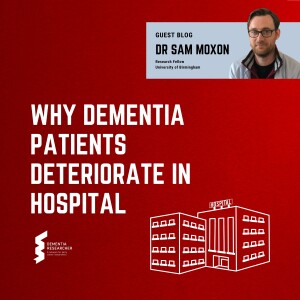
Tuesday Jul 04, 2023
Dr Sam Moxon - Why Dementia Patients Deteriorate in Hospital
Tuesday Jul 04, 2023
Tuesday Jul 04, 2023
Dr Sam Moxon, narrates his blog written for Dementia Researcher.
Sam shares the story of his grandfather, who experienced a rapid decline in his dementia during a hospital stay. Hospital delirium, triggered by the unfamiliar environment, disrupted routines, and increased sensory stimulation, worsened his condition. Infections further accelerated cognitive decline, and antibiotics had negative effects on the gut microbiome and immune system. Sam emphasises the need for improved dementia care in hospitals to provide better support and maintain the well-being and dignity of individuals with dementia.
Find the original text, and narration here on our website.
https://www.dementiaresearcher.nihr.ac.uk/guest-blog-why-dementia-patients-deteriorate-in-hospital/
--
Dr Sam Moxon is a biomaterials Research Fellow at University of Birmingham. His expertise falls on the interface between biology and engineering. His PhD focussed on regenerative medicine and he now works on trying to develop 3D bioprinting techniques with human stem cells, so that we better understand and treat degenerative diseases. Outside of the lab he hikes through the Lake District and is an expert on all things Disney.
Enjoy listening and reading our blogs? We're always on the look out for new contributors, drop us a line and share your own research and careers advice dementiaresearcher@ucl.ac.uk
This podcast is brought to you in association with Alzheimer's Association, Alzheimer's Research UK, Alzheimer's Society and Race Against Dementia, who we thank for their ongoing support.
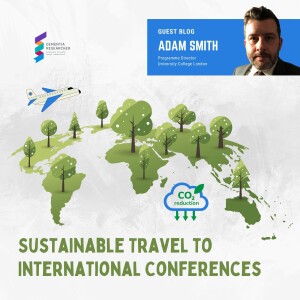
Sunday Jul 02, 2023
Adam Smith - Sustainable Travel to International Conferences
Sunday Jul 02, 2023
Sunday Jul 02, 2023
Adam Smith narrates his blog written for Dementia Researcher.
In this blog Adam emphasises the importance of sustainable travel to international conferences in light of climate change. While attending conferences in person is essential, Adam encourages listeners to consider concious decision making on travel choice, and particuarly carbon offsetting as a way to reduce the environmental impact of their journeys. By supporting projects that reduce or remove greenhouse gas emissions, such as renewable energy initiatives or reforestation efforts, attendees can take personal responsibility for their carbon footprint.
The blog also highlights the significance of incorporating discussions on climate change and sustainability within conference agendas, driving greater awareness and promoting actionable solutions. Below are resources for calculating and offsetting carbon emissions, as well as tips for reducing one's carbon footprint while traveling, including choosing greener airlines, flying economy class, and opting for direct flights or train travel for shorter distances. By offsetting travel emissions, attendees can contribute to positive change, inspire others to adopt sustainable practices, and enhance the credibility of conferences as platforms for environmental stewardship.
Find the original text, and narration here on our website.
https://www.dementiaresearcher.nihr.ac.uk/guest-blog-sustainable-travel-to-international-conferences/
List of Carbon Calculators:
https://www.carbonfootprint.com/
https://www.bp.com/en_gb/target-neutral/home/calculate-and-offset-travel-emissions.html#/
https://www.eurostar.com/rw-en/carbon-footprint
https://co2.myclimate.org/
Websites that allow you to pay to offset your carbon footprint:
https://co2.myclimate.org/
https://www.woodlandtrust.org.uk/support-us/give/personal-carbon/
https://www.worldwildlife.org/pages/offset-your-travel-footprint
--
Adam Smith was born in the north, a long time ago. He wanted to write books, but ended up working in the NHS, and at the Department of Health. He is now Programme Director in the Office of the NIHR National Director for Dementia Research (which probably sounds more important than it is) at University College London. He has led a number of initiatives to improve dementia research (including this website, Join Dementia Research & ENRICH), as well as pursuing his own research interests. In his spare time, he grows vegetables, builds Lego & spends most of his time drinking too much coffee and squeezing technology into his house.
_____________________________________________________
Enjoy listening? We're always looking for new bloggers, drop us a line. http://www.dementiaresearcher.nihr.ac.uk
This podcast is brought to you in association with Alzheimer's Association, Alzheimer's Research UK, Alzheimer's Society and Race Against Dementia, who we thank for their ongoing support.
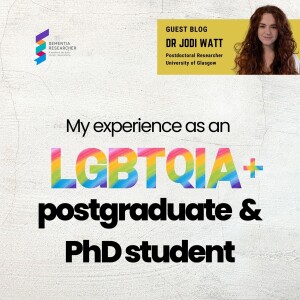
Thursday Jun 29, 2023
Dr Jodi Watt - My experience as an LGBTQIA+ postgraduate & PhD student
Thursday Jun 29, 2023
Thursday Jun 29, 2023
Dr Jodi Watt, narrating a new blog they wrote for the Dementia Researcher website.
As Pride month comes to an end, Jodi shares their experience as an LGBTQIA+ postgraduate and PhD student. They discuss the challenges and variability of being 'out' and queer in academia, highlighting both supportive and discriminatory experiences. Josi emphasises the importance of acknowledging the mental, emotional, and physical burdens that LGBTQIA+ individuals may carry in a heteronormative world, which can impact their scientific career. They also express the desire for more representation and role models in academia who identify similarly, as well as the significance of using LGBTQIA+ lanyards, badges, and pronouns in creating a supportive environment. Jodi highlights the opportunities for involvement in extra-curricular experiences that can enrich one's CV and mentions the legal protections provided by The Equality Act 2010 in the UK. Finally, they affirm that it is not only acceptable but essential for LGBTQIA+ individuals to occupy and feel comfortable in scientific spaces.
Find the original text, and narration here on our website.
https://www.dementiaresearcher.nihr.ac.uk/guest-blog-my-experience-as-an-lgbtqia-postgraduate-phd-student/
--
Dr Jodi Watt is a Postdoctoral Researcher at University of Glasgow. Jodi's academic interests are in both healthy ageing and neurodegenerative diseases of older age, and they are currently working on drug repurposing for dementia. Previously they worked on understanding structural, metabolic and physiological brain changes with age, as measured using magnetic resonance imaging. As a queer and neurodiverse person, Jodi is also incredibly interested in improving diversity and inclusion practices both within and outside of the academic context.
--
Enjoy listening? We're always looking for new bloggers, drop us a line. http://www.dementiaresearcher.nihr.ac.uk
This podcast is brought to you in association with Alzheimer's Association, Alzheimer's Research UK, Alzheimer's Society and Race Against Dementia, who we thank for their ongoing support.
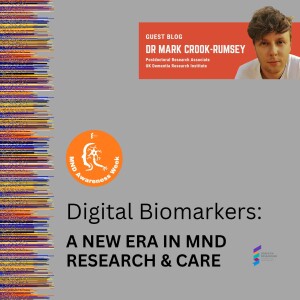
Wednesday Jun 28, 2023
Dr Mark Crook-Rumsey - Digital Biomarkers: A New Era in MND Research and Care
Wednesday Jun 28, 2023
Wednesday Jun 28, 2023
Dr Mark Crook-Rumsey narrates his blog written for Dementia Researcher.
Motor Neuron Disease (MND) is a complex and challenging neurodegenerative disease, in this blog Mark discusses the UK DRI work on the development of digital biomarkers through remote monitoring technologies, showing they have the potential to revolutionise MND research, enabling real-time, non-invasive data collection, improving disease understanding, facilitating more effective treatments, and enhancing the quality of life for patients.
Find the original text, and narration here on our website.
https://www.dementiaresearcher.nihr.ac.uk/guest-blog-digital-biomarkers-a-new-era-in-mnd-research-and-care/
--
Dr Mark Crook-Rumsey is a Postdoctoral Research Associate at the UK Dementia Research Institute. His role is to bridge the gap between the two centres and combine the technology developed at Imperial College London’s Care Research and Technology Centre with the clinical expertise in motor neurone disease at King’s College London. His current focus being digital biomarkers for Motor Neuron Disease (MND).
--
Enjoy listening and reading our blogs? We're always on the look out for new contributors, drop us a line and share your own research and careers advice dementiaresearcher@ucl.ac.uk
This podcast is brought to you in association with Alzheimer's Association, Alzheimer's Research UK, Alzheimer's Society and Race Against Dementia, who we thank for their ongoing support.
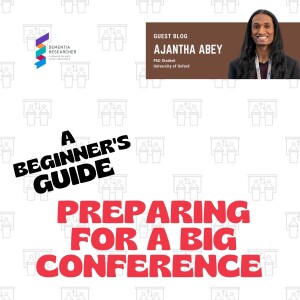
Tuesday Jun 27, 2023
Ajantha Abey - A Beginner’s Guide to Preparing for a Big Conference
Tuesday Jun 27, 2023
Tuesday Jun 27, 2023
Ajantha Abey narrates his blog written for Dementia Researcher.
In "A Beginner's Guide to Preparing for a Big Conference," (with the AAIC around the corner) Ajantha advises on strategies to make the most of conferences. They stress the importance of planning, setting goals, and prioritizing sessions. The guide offers tips for effective networking, taking notes, and scheduling rest afterwards. Overall, the he emphasises the value of being prepared and organised to navigate conferences successfully.
Find the original text, and narration here on our website.
https://www.dementiaresearcher.nihr.ac.uk/guest-blog-a-beginners-guide-to-preparing-for-a-big-conference/
--
Ajantha Abey is a PhD student in the Kavli Institute at University of Oxford. He is interested in the cellular mechanisms of Alzheimer's, Parkinson's, and other diseases of the ageing brain. Previously, having previoulsy explored neuropathology in dogs with dementia and potential stem cell replacement therapies. He now uses induced pluripotent stem cell derived neurons to try and model selective neuronal vulnerability: the phenomenon where some cells die but others remain resilient to neurodegenerative diseases.
--
Enjoy listening and reading our blogs? We're always on the look out for new contributors, drop us a line and share your own research and careers advice dementiaresearcher@ucl.ac.uk
This podcast is brought to you in association with Alzheimer's Association, Alzheimer's Research UK, Alzheimer's Society and Race Against Dementia, who we thank for their ongoing support.
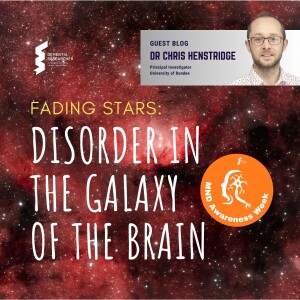
Thursday Jun 22, 2023
Dr Chris Henstridge - Fading stars: disorder in the galaxy of the brain
Thursday Jun 22, 2023
Thursday Jun 22, 2023
Dr Chris Henstridge, narrates his blog written for Dementia Researcher.
It's Motor Neurone Disease Awareness Week, and in this blog Chris discusses the significance of synapse loss in Frontotemporal Dementia (FTD) and Motor Neuron Disease (MND), highlighting the overlap in cognitive decline and similar brain changes observed in both diseases. He explores the link between synapse loss, cognitive decline, and the presence of disease-associated proteins, such as TDP-43, in the brain, emphasizing the importance of collaborative research and understanding commonalities between different neurodegenerative diseases for advancements in treatment and improving the quality of life for patients.
Find the original text, and narration here on our website.
https://www.dementiaresearcher.nihr.ac.uk/guest-blog-fading-stars-disorder-in-the-galaxy-of-the-brain/
--
Dr Chris Henstridge is a Principle Investigator at University of Dundee. Chris studies anatomical and molecular changes in the human synapse, with a particular focus on Motor Neuron Disease (MND). Chris grew up on the far north coast of Scotland and that beautiful location instilled his interest in nature and biology. He completed his PhD in Dundee, then spent time in Budapest and other parts of Scotland, before returning to Dundee to establish his own lab.
Enjoy listening and reading our blogs? We're always on the look out for new contributors, drop us a line and share your own research and careers advice dementiaresearcher@ucl.ac.uk
This podcast is brought to you in association with Alzheimer's Association, Alzheimer's Research UK, Alzheimer's Society and Race Against Dementia, who we thank for their ongoing support.
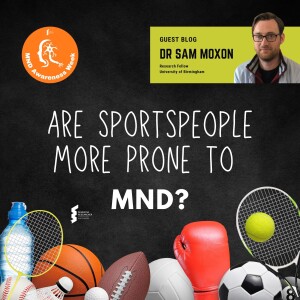
Wednesday Jun 21, 2023
Dr Sam Moxon - Are Sportspeople More Prone to MND?
Wednesday Jun 21, 2023
Wednesday Jun 21, 2023
Dr Sam Moxon, narrates his blog written for Dementia Researcher.
The potential connection between sports, particularly contact sports with repetitive head trauma, and neurodegenerative diseases like Motor Neurone Disease (MND) and Chronic Traumatic Encephalopathy (CTE) raises concerns. While the evidence remains inconclusive, studies have shown a higher risk of MND among retired rugby players, possibly related to the development of CTE. This has prompted efforts by governing bodies to prioritise athlete safety, implement stricter protocols, and collaborate with researchers to better understand the potential links between these sports and neurodegenerative diseases, emphasising education and injury prevention strategies. Sam Moxon explores the research in his latest blog.
Find the original text, and narration here on our website.
https://www.dementiaresearcher.nihr.ac.uk/guest-blog-are-sportspeople-more-prone-to-mnd/
--
Dr Sam Moxon is a biomaterials Research Fellow at University of Birmingham. His expertise falls on the interface between biology and engineering. His PhD focussed on regenerative medicine and he now works on trying to develop 3D bioprinting techniques with human stem cells, so that we better understand and treat degenerative diseases. Outside of the lab he hikes through the Lake District and is an expert on all things Disney.
Enjoy listening and reading our blogs? We're always on the look out for new contributors, drop us a line and share your own research and careers advice dementiaresearcher@ucl.ac.uk
This podcast is brought to you in association with Alzheimer's Association, Alzheimer's Research UK, Alzheimer's Society and Race Against Dementia, who we thank for their ongoing support.
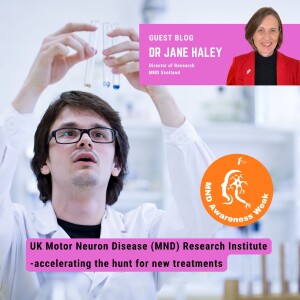
Sunday Jun 18, 2023
Dr Jane Haley - UK Motor Neuron Disease Research Institute
Sunday Jun 18, 2023
Sunday Jun 18, 2023
Dr Jane Haley narrates her blog written for Dementia Researcher.
Jane highlights the establishment of the UK MND Research Institute (UK MND RI) as a significant milestone in the pursuit of disease-modifying treatments for motor neuron disease (MND). MND is a devastating condition that rapidly deteriorates physical abilities and has limited treatment options. The UK MND RI aims to bridge the gap between fundamental research and clinical trials, with a focus on diagnostics, biomarker development, therapeutic testing using human-based cell models, and data utilisation. The institute operates through collaboration, bringing together talented researchers and patient campaigners to accelerate progress and ultimately find a cure for MND.
Find the original text, and narration here on our website.
https://www.dementiaresearcher.nihr.ac.uk/guest-blog-uk-motor-neuron-disease-research-institute/
--
Dr Jane Haley is Director of Research for MND Scotland. Jane is respondiable for developing and delivering the MND Scotland research strategy and overseeing their wide portfolio of grant funding. Outside the office Jane is a Girlguide leader, Treasurer and Trustee for Girlguiding Midlothian. Her tip for ECRs? Talk to people and willingly collaborate. You won’t regret it.
--
Enjoy listening? We're always looking for new bloggers, drop us a line. http://www.dementiaresearcher.nihr.ac.uk
This podcast is brought to you in association with Alzheimer's Association, Alzheimer's Research UK, Alzheimer's Society and Race Against Dementia, who we thank for their ongoing support.

Friday Jun 16, 2023
Dr Gaia Brezzo - Searching for the ‘whole’ scientist - juggling academia
Friday Jun 16, 2023
Friday Jun 16, 2023
Dr Gaia Brezzo narrates her blog written for Dementia Researcher.
In this blog Gaia discusses the struggle of balancing multiple aspects of an academic career, highlighting the need for personal and career development, and emphasising the importance of taking time for higher-level thinking and skill development.
Find the original text, and narration here on our website.
https://www.dementiaresearcher.nihr.ac.uk/guest-blog-searching-for-the-whole-scientist-juggling-academia/
--
Dr Gaia Brezzo is a Research Fellow based within the UK Dementia Research Institute at The University of Edinburgh. Gaia's research focuses on understanding how immune alterations triggered by stroke shape chronic maladaptive neuroimmune responses that lead to post-stroke cognitive decline and vascular dementia. Raised in Italy, Gaia came to the UK to complete her undergraduate degree, and thankfully, stuck around. Gaia writes about her work and career challenges, when not biking her way up and down hills in Edinburgh. Follow Gaia on Twitter: @Gaia_Brezzo
--
Enjoy listening? We're always looking for new bloggers, drop us a line. http://www.dementiaresearcher.nihr.ac.uk
This podcast is brought to you in association with Alzheimer's Association, Alzheimer's Research UK, Alzheimer's Society and Race Against Dementia, who we thank for their ongoing support.





